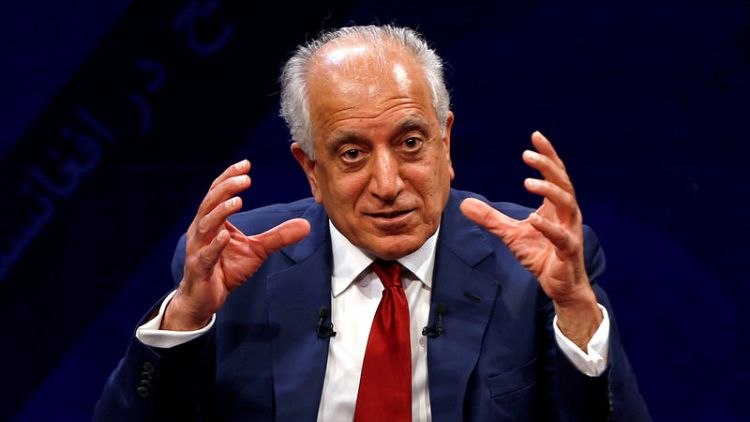By Jonathan Landay and Steve Holland
WASHINGTON (Reuters) - As negotiators work to nail down an agreement with the Taliban to withdraw U.S. troops from Afghanistan, misgivings have grown among some Trump administration officials and lawmakers that it will erode the United States' ability to thwart attacks from there, U.S. officials said.
Their concerns collide with U.S. President Donald Trump's impatience to secure a deal to draw down 14,000 troops and end America's longest war, allowing him to claim a foreign policy victory as he campaigns for re-election in 2020.
On Thursday, Trump appeared to reflect some of his aides' caution, telling Fox News Radio that U.S. troops would initially be reduced https://www.reuters.com/article/us-usa-afghanistan-trump/trump-u-s-will-maintain-presence-in-afghanistan-even-if-deal-reached-with-taliban-idUSKCN1VJ1R8 to 8,600, and "then we make a determination from there as to what happens."
Zalmay Khalilzad, an Afghan-born U.S. diplomat, has led nine rounds of talks with Taliban leaders on ending a conflict triggered by the Sept. 11, 2001 attacks on the United States that were hatched by al Qaeda from what was then Taliban-ruled Afghanistan.
In return for the U.S. drawdown, the Taliban would renounce ties with al Qaeda and guarantee Afghanistan would not be used to plot operations against the United States or its allies. They also would open talks on a political settlement with the Afghan government, opposition parties and civil society.
U.S. officials say a U.S. withdrawal would be "conditions-based" and would stop if the Taliban reneged on the agreement.
However, some U.S. officials, commanders and lawmakers neither trust the Taliban and its elite operations arm, the Haqqani network, to break with al Qaeda nor believe they can keep their ally from plotting attacks, U.S. officials and regional experts said.
"We cannot just wish these wars away unfortunately," said Republican Representative Michael Waltz, a former Green Beret officer who commanded U.S. special forces in Afghanistan. "They will follow us home."
"Even if you believe Taliban assurances (of) denying safe haven to al Qaeda, I don't see how they even have the capability to do so," said Waltz, a House of Representatives Armed Services Committee member.
A State Department spokeswoman said the United States was not taking the Taliban on trust.
"We're well aware of the history of the Taliban, including the Haqqani network and its complicated history with al Qaeda, which is exactly why any deal, if one is reached, will be so stringently monitored and verified," she said. "The agreement we’re working on is not based on trust."
SECRECY
Among the factors unsettling U.S. officials is the secrecy with which details of negotiations has been held, the fact that they have not been hashed out among the affected U.S. agencies and uncertainty as to whether Trump himself has read the proposed agreement.
Weighing on Waltz, other lawmakers and some U.S. officials is the 2011 U.S. troop withdrawal from Iraq. In 2014, the Islamic State militant group seized swathes of Iraq and Syria, forcing U.S. troops to redeploy.
Those critical about the Afghanistan talks included Trump’s national security adviser, John Bolton, according to knowledgeable sources.
Bolton was initially not invited to an Aug. 16 meeting at Trump's New Jersey golf club where the president was briefed on Khalilzad's negotiations, sources told Reuters.
Acting White House chief of staff Mick Mulvaney then invited Bolton because his exclusion was seen as a highly unusual slight and because Trump likes hearing a wide array of voices, said one source.
The secrecy of the negotiations has led congressional committees to halt State Department plans to halve the number of staff at the U.S. Embassy in Kabul, said a congressional aide.
U.S. officials and lawmakers also worry that as the U.S. troop level drops, U.S.-backed Afghan security forces will be harder pressed to contain Islamic State's local affiliate, Islamic State-Khorasan (ISIS-K). The affiliate is gaining control of more territory as its ranks swell with irreconcilable Taliban fighters, U.S. officials and experts said.
The Pentagon warned in a June report that even if an accord is reached, al Qaeda, Islamic State and Taliban "hard-liners" would remain "a substantial threat."
"A lot of people are very nervous about this," said a former Pentagon official who requested anonymity. "U.S. intelligence suggests a robust terrorist presence in Afghanistan and Pakistan and lots of risk in a substantial reduction in the U.S. presence."
The former official said al Qaeda had embedded its personnel inside Taliban units, intermarried with Taliban families and "it would be stunning to see the Taliban suddenly throw an important ally under the bus."
U.S. officials say the accord would provide for monitoring and verifying Taliban compliance. That, most likely, would be done by the CIA and Trump on Thursday said the United States would retain a "high intelligence" presence in Afghanistan as troops withdraw.
However, the CIA mainly relies on U.S. troops for protection and as their number dwindles, U.S. intelligence agencies would have to consolidate into fewer bases, limiting their ability to track threats and forcing increased reliance on proxy militias whose heavy-handedness has made them unpopular, experts said.
"That’s risky and challenging but not impossible," said a former senior intelligence official, who requested anonymity. "The question is how much are you going to miss if you are heavy in Kabul and not so much out in provinces controlled by the Taliban, ISIS and al Qaeda?"
(Reporting by Jonathan Landay and Steve Holland; Additional reporting by Idrees Ali; Editing by Mary Milliken and Grant McCool)
